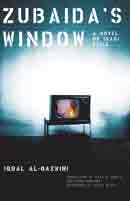

Feminist Press, hardcover, 9781558615724
In her sitting room in Berlin, Zubaida watches in horror as her homeland of Iraq is ravaged on the TV screen during the 2003 invasion. She is tormented by the senseless loss of life and the sheer volume of destruction. Some 20 years before, while in Germany for a women's conference, Zubaida was forced into exile. Her return to Iraq at that point would have meant certain imprisonment, or worse, at the hands of the despot who had just usurped power. She has always dreamed of returning home, but now these dreams fade rapidly as her beloved country is reduced to smithereens. As scenes of devastation unfold over the months that follow, she cannot tear herself away from the televised action, and the results of her vigilance are debilitating.
As the title indicates, this book is a window into Zubaida's world: the cold, alien outside world that she inhabits in Europe but also, more importantly, her inner world that sometimes borders on madness as a result of her torment. The destruction she sees tears at her soul, leaving her dizzy and breathless. She loses whole nights of sleep and cannot function properly during the day. Time slows to a halt. In an effort to restore her life to normality, she sometimes goes to a restaurant and orders a cup of tea. This act of sitting down to tea makes her feels better momentarily. However, she does not drink the tea but rather carries herself home again to her TV, where she continues her vigil over Iraq.
Arabic is a rich poetic language, so metaphors abound in this translation. Zubaida has an overactive imagination. She struggles to concentrate when she reads at the railway station: "The letters dance over the lines at first, then slip over the space of the glossy white paper, leaping eventually to the platform, and running to hide in the empty Coca-Cola cans scattered here and there." Repetition is plentiful as we follow Zubaida's stream of thought, encompassing the alienation, nostalgia, and depression she feels. Time, Memory, and Insomnia take on character-like proportions: "Insomnia ... does not knock at the door, but rather enters without permission and sits on the edge of her bed, gently putting its hand on her shoulder."
Zubaida's Window may be an uncomfortable and challenging read, but it is an important one. This
autobiographical novel presents English-speaking readers with the perspective of one of the
millions of Iraqis in exile globally – and, refreshingly, a woman's perspective at that!